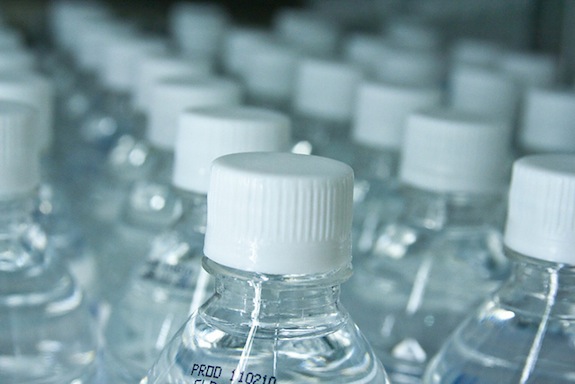Water Never Goes Bad, So Why Does It Need an Expiration Date?
Really, you shouldn’t be worried about the water, but about the bottle.

Image: Steven Depolo
If you’ve ever examined a bottle of water, you might notice that it has an expiration date. This is kind of weird—water doesn’t really expire, right? But, really, you shouldn’t be worried about the water, but about the bottle.
Mental Floss explains why anyone bothered starting labeling bottled water to begin with :
A 1987 NJ state law required all food products sold there to display an expiration date of two years or less from the date of manufacture. Labeling, separating and shipping batches of expiration-dated water to the Garden State seemed a little inefficient to bottled water producers, so most of them simply started giving every bottle a two-year expiration date, no matter where it was going.
The regulation is no longer there, but everybody still prints the date since it’s built into their production process. Life’s Little Mysteries writes:
Furthermore, many companies bottle water using the same machines they use to bottlesodas and other beverages which do expire and should carry an expiration date. It’s easier and more efficient to simply put a stamp on all the bottles (whether needed or not) rather than dedicating a special machine just for bottled water.
So the water inside isn’t going to go bad on its own. What might ruin things is the plastic that it’s wrapped in. Here’s Mental Floss again:
The plastic that water is packaged in — usually polyethylene terephthalate (PET) for retail bottles and high-density polyethylene (HDPE) for water cooler jugs – is slightly porous, so the water can pick up smells and tastes from the outside world. Keep a case of bottled water in the basement for a year or so and it’s going to pick up some interesting flavors. There’s nothing better on a hot summer day than a 2007 Evian, with hints of dust and a crisp kitty litter finish!
At About.com’s Chemistry section, they explain that just because it’s been sitting there for a while doesn’t make it any more dangerous than a fresh bottle:
Leaching of chemicals from packaging is a health concern, but as far as toxic chemicals go, you can get exposure to most of those chemicals from freshly bottled water as well as bottled water that has been on the shelf a while. A ‘plastic’ taste is not necessarily an indicator that the water is bad; absence of an unpleasant flavor does not mean the water is free from contaminants.
But as long as you store the bottles, unopened, like you would any other sealed food product, you’re probably fine.
More from Smithsonian.com:
/https://tf-cmsv2-smithsonianmag-media.s3.amazonaws.com/accounts/headshot/Rose-Eveleth-240.jpg)
/https://tf-cmsv2-smithsonianmag-media.s3.amazonaws.com/accounts/headshot/Rose-Eveleth-240.jpg)